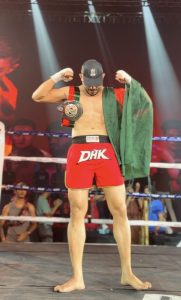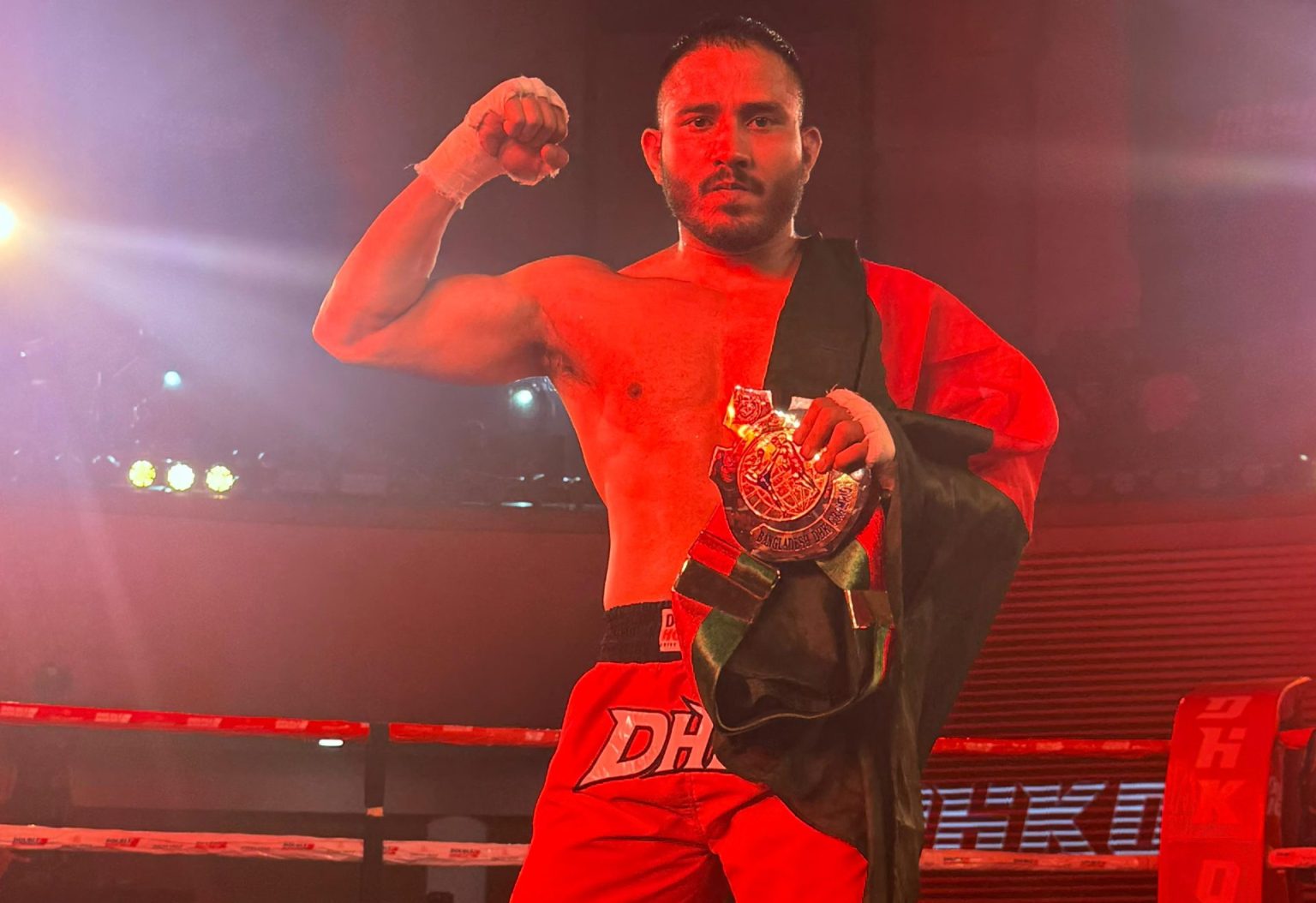Like it or not, mixed martial arts is one of the fastest growing sports in the world. That’s not exactly a surprise either. With the amount of action films that have been popular throughout the years, it’s no wonder real fighting between professionals are getting the same treatment. In Bangladesh, the fight is still in its infancy but it’s slowly crawling into people’s minds.
With the recent MMA event Double Horse Knockouts 001 just gone by, Times of Bangladesh sat down with the main event winner Mohammed Rashed about his journey, his philosophy and the potential future of the sport in the country.
Times Sports: How did your journey start?
Rashed: Well I have liked action movies from my childhood. I used to watch films which had great action sequences. Jackie Chan, Bruce Lee, and Jason Statham were some of my favourites growing up.
This one time, while going to a flexiload shop I saw a pamphlet, advertising a place where they teach kickboxing. So that’s where I started training for Jeet Kune Do.
In the meantime, I regularly watched youtube videos of muay thai fighters and their fights. So I started to look for gyms which taught Muay Thai. Then I found a coach, Asif Mahmud, and I started training with him. That’s how my journey started.
Times Sports: Why did you choose Muay Thai over other forms of combat sports?
Muay Thai fascinates me since their kicks are a lot stronger than other sports like boxing or kickboxing. In addition to that, knees and elbows are also integrated in this style. I like this aspect of Muay Thai. So it just clicked for me in this sport.


Times Sports: What about the philosophy of Muay Thai? Does it adhere to you?
Yes, you can say that. Respect, Discipline and Hardwork.
Times Sports: Who would you say your favourite fighter is?
I watch a lot of MMA and Muay Thai. I would say my favourite active fighter right now is Ilia Topuria from the UFC. As for Muay Thai, my all time favourite is Buachaw Banchamek. Watching Buachaw is where my fascination with Muay Thai started.
Times Sports: If you hadn’t chosen Muay Thai, what other form of combat sport would you choose?
I think I would’ve gone for MMA. Mixed Martial Arts.
Times Sports: What does a typical training day look like?
The training starts with warm ups in the gym (Zulcan Combat Gym). We do rope skipping, usually 3 or 4 rounds, eacho 5 minutes long. Then we take some rest.
After that we do some bag work, then some knee work. Two days a week we do sparring. One day it’s boxing sparring, the other day Muay Thai sparring.
Times Sports: What do you do after a fight?
After the fight, I rest. Recover and eat my favourite foods. No more diets after the fight. Before the fight, we have to cut weight to qualify for our weight classes.
But after a fight is done, there is no more dieting. I can freely eat whatever I like. Weight cutting is tough, but it’s fun as well for me.
Times Sports: How do you think Muay Thai and combat sports in general, is perceived in Bangladesh?
MMA has been growing in Bangladesh recently. That is nice to see. As for Muay Thai, it was overlooked for a long time. But now it’s finally getting the recognition it deserves.
The recent event done by Jamuna Group. Double Horse Knockouts 001, I believe this is one of the most significant sporting events in this country’s combat sports history. I believe Muay Thai can get a kick from this event.
Times Sports: If we look at UFC, they had to overcome a lot of difficulties in their early days to get to where they are now. Can you see the same in Bangladesh?
Yeah I think so. It’s going to take some time but the sport can get as popular as football or cricket. The sport needs to get a lot more exposure, in order to reach the masses.
We need to do a lot more major fighting events if we want to reach that stage. Every two or three months, there should be a fighting event.
Times Sports: Do you get any support from any organisations or sporting boards in Bangladesh?
No, we don’t. The sporting government doesn’t really support us. In this fight, I had a sponsor, that’s how I made my money.
Times Sports: Do you think somebody should come forward and take a step towards professionalising the sport?
Yeah definitely. For fighters, most of our money comes from sponsors, which are usually private companies. I think the sport is in a growing stage, Jamuna group and Bashundhara group are already working with the sport. I believe the other private groups should come forward to grow the sport as well.
Times Sports: Have you had the chance to visit Thailand?
I had my first fight in Thailand and it was not a good decision frankly speaking. I was just starting out, I wasn’t properly trained. I couldn’t work out the proper weight classes and weight cuts, there were some issues regarding that.
I lost the fight, I was supposed to fight an amateur opponent but it was a professional guy from Max Muay Thai. He was much bigger than me and much better technically, so all in all, it was not a good decision to do that fight.
Times Sports: How big is the difference in quality between Thailand and Bangladesh?
It’s massive. In Bangladesh, it’s just recently starting to grow but in Thailand, it’s been there forever. People do Muay Thai for a living, they learn the sport from the age of six or seven. It’s a national sport.
The difference in quality is very apparent and I don’t think Bangladesh will ever reach their levels. We don’t have the infrastructure required to compete at their level.
Times Sports: What is next for Mohammed Rasheed?
To be honest, I want to rest. Before the fight here in Bangladesh, I fought in Sri Lanka. It was a South Asian WBC Championship fight for Muay Thai.
I couldn’t properly recover from that fight. I had a lot of injuries but I was told to do the main event in this fight and I competed here. So back to back, I had three fights in two months. Now, I need a good rest.


